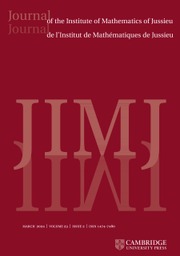Article contents
Loewy series of parabolically induced  $G_1T$-Verma modules
$G_1T$-Verma modules
Published online by Cambridge University Press: 28 March 2014
Abstract
We show that the modules for the Frobenius kernel of a reductive algebraic group over
an algebraically closed field of positive characteristic  $p$ induced from the
$p$ induced from the  $p$-regular blocks of its parabolic subgroups can be
$p$-regular blocks of its parabolic subgroups can be  $\mathbb{Z}$-graded. In particular, we obtain that the modules induced from the
simple modules of
$\mathbb{Z}$-graded. In particular, we obtain that the modules induced from the
simple modules of  $p$-regular highest weights are rigid and determine their Loewy series,
assuming the Lusztig conjecture on the irreducible characters for the reductive
algebraic groups, which is now a theorem for large
$p$-regular highest weights are rigid and determine their Loewy series,
assuming the Lusztig conjecture on the irreducible characters for the reductive
algebraic groups, which is now a theorem for large  $p$. We say that a module is rigid if and only if it admits a unique
filtration of minimal length with each subquotient semisimple, in which case the
filtration is called the Loewy series.
$p$. We say that a module is rigid if and only if it admits a unique
filtration of minimal length with each subquotient semisimple, in which case the
filtration is called the Loewy series.
MSC classification
- Type
- Research Article
- Information
- Journal of the Institute of Mathematics of Jussieu , Volume 14 , Issue 1 , January 2015 , pp. 185 - 220
- Copyright
- © Cambridge University Press 2014
References
- 3
- Cited by


